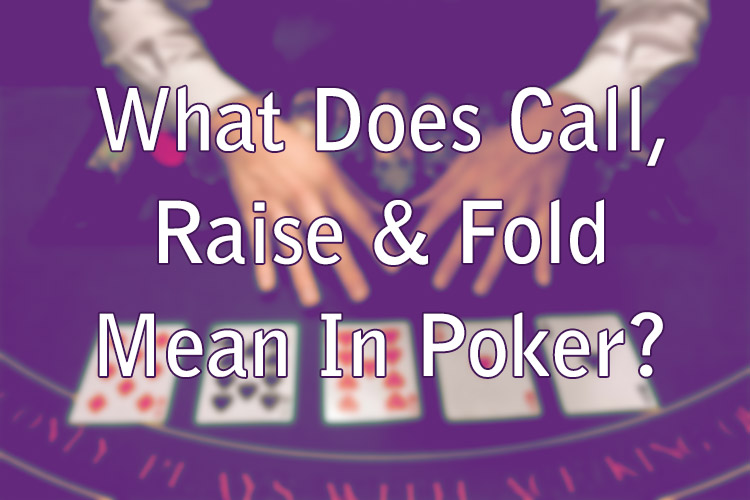
If playing poker online has ever crossed your mind, learning the correct terminology is highly advised. It can be intimidating arriving at the poker table and not knowing what call, bet, raise, fold, and other online poker terminologies could mean.
Knowing the meanings behind these terms goes a long way in helping you better understand the game. The actions may sound simple, but effectively utilising them differentiates professional poker players from amateurs.
Knowing when to call, raise, or fold is important because a wrong play could potentially cause you to miss out on larger winnings. So stick with us, and we’ll show you what these poker terms mean and when you should use them.
What Does Call Mean In Poker?
When you ‘call’, you match the amount other players have put in by making a bet or a raise. If you or no one else can match the bet put forward, the uncalled player wins the hand. If the hand proceeds to the final betting round, where player X bets and player Y calls, the best hand wins.
Calling is easy. You can say ‘Call’ and then put the chips into the pot. Note that you cannot go back on a verbal action in poker. So, if you say ‘Call’ and didn’t put in the right amount of chips initially, you’ll need to correct it and add the exact amount. Ensure you’re always comfortable with the bet before calling.
When Should You Call In Poker?
It’s not always easy to know when to call a bet. Calling may be appropriate if you have a moderate hand, i.e., one not weak enough to qualify as a poor decision or one not strong enough to raise.
An appropriate time to call is if you want to slow-play a strong hand. For example, if you have pocket aces, you may then try to grow the pot. Let’s say your opponent bets, the ideal move would then be to call instead of raising if your tactic is to keep more players in the game to wait for the pot to grow.
What Does Raise Mean In Poker?
Raising is when the player increases the opening bet. If you raise, other players can fold, call, or re-raise. This move could mean you have a strong hand or are attempting to increase the pot value. Raising can also be used when bluffing.
Sounds easy, right? However, knowing when to raise is the most crucial part.
When Should You Raise In Poker?
You can raise pre-flop in a few ways. For example;
Raise to win more
Having a strong hand that could win would be good grounds to raise. Raising in this instance could help to maximise your profits if other players call after this.
Raising protects your hand
If you have a strong hand that could win, but there is the chance of a stronger hand being formed by another player (i.e. your hand isn’t strong enough to slow play the round), you can raise to protect your hand. It works by putting the other players in a position where they would have to call - potentially with poor pot odds - or fold.
Raise on the bluff
Raising on the bluff is for if you have a weak hand that doesn’t have much hope for improvement and you try to induce other players into folding by raising as if you hold a stronger hand than you actually do.
Raise to look for information
Let’s say you have a strong hand but are unsure about what your opponents are holding. A good move would be to raise, but not by too much. In most cases, you can get an indication as to what the other player is holding; the player may fold if they have a weak hand or call if they also believe they have a strong hand. Either way, you can have a slightly better idea of what you’re up against.
What Does Fold Mean In Poker?
Folding is when you no longer want to play your hand. You can throw your cards in the middle or say ‘Fold’ to indicate that you’re done playing during your turn. In addition, you can click the ‘Fold’ button if you’re playing online at Wizard Slots casino. Folding means leaving the game and losing all the money you put into the pot. You can’t win, but you also cannot lose any more money this round.
You cannot fold in the middle of the hand. In addition, you should never show your cards to other players when you do. It is bad etiquette because it gives unfair information to other players.
When Should You Fold In Poker?
You may consider folding if you have a weak hand that doesn’t show much promise. Folding early is common, especially if the initial deal has not gone a player’s way.
Most players think that folding is a sign of weakness. However, the move is a good strategy that can protect you from losing more money. Even the most skilled poker players know that folding can be crucial. You’re not likely to win every hand in poker, so weighing your options and making proper decisions, such as when to fold and when to proceed, helps.
Conclusion
Knowing these basic terms and when to use them is a solid starting point in poker; these are the foundations upon which players build their skills.
If you are looking for great online poker games to play, look no further than Wizard Slots! We have an extensive collection of incredible online casino games and real money slot games online.
